2013春版新目标Unit1 Period 2
2018-2019人教新目标高中英语选修六课后阅读训练: 二 Unit 1 Period 2 含答案
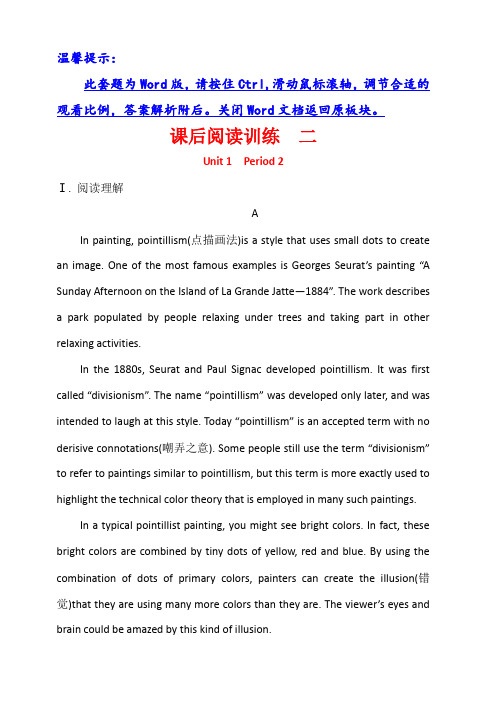
温馨提示:此套题为Word版,请按住Ctrl,滑动鼠标滚轴,调节合适的观看比例,答案解析附后。
关闭Word文档返回原板块。
课后阅读训练二Unit 1Period 2Ⅰ. 阅读理解AIn painting, pointillism(点描画法)is a style that uses small dots to create an image. One of the most famous examples is Georges Seurat’s painting“A Sunday Afternoon on the Island of La Grande Jatte—1884”. The work describes a park populated by people relaxing under trees and taking part in other relaxing activities.In the 1880s, Seurat and Paul Signac developed pointillism. It was first called “divisionism”. The name“pointillism” was developed only later, and was intended to laugh at this style. Today “pointillism” is an accepted term with no derisive connotations(嘲弄之意). Some people still use the term “divisionism”to refer to paintings similar to pointillism, but this term is more exactly used to highlight the technical color theory that is employed in many such paintings.In a typical pointillist painting, you might see bright colors. In fact, these bright colors are combined by tiny dots of yellow, red and blue. By using the combination of dots of primary colors, painters can create the illusion(错觉)that they are using many more colors than they are. The viewer’s eyes and brain could be amazed by this kind of illusion.Pictures in magazines and newspapers are printed in a method similar to pointillism. Additionally, electronic screens like TVs use a similar technique. Screens display dots of red, blue and green, and our eyes and brains combine these collections of dots as detailed color images.Learning about pointillism is interesting not only from the view of art history. The masters of pointillism created outstanding masterpieces using this technique. Children can learn about and practice pointillism in order to get hands-on experience that can help them to understand color mixing and the principles of vision that make it possible. Because so many of our modern technologies rely on similar ideas to create the images we see around us.【语篇概述】本文主要介绍了绘画艺术中的点描画法这种艺术风格, 它主要是利用圆点做出令人惊奇的绘画效果。
Unit1Period2Learningaboutlanguage(分层作业)(原卷版)

Unit 1 Period 2 Learning about languageⅠ.语境填词1. The bacteria were then examined under the __________ (显微镜).2. There is no __________ (证据) that the house which they are living in belongs to her.3. Customs officials have made a series of __________ (相互矛盾的) statements about the equipment.4. To go from one robot to __________ (多种多样的) robots, you need all three of those ideas.5. Most __________ (家庭) now own at least one car.6. So what we would do is that we would then perform an __________ (干涉).7. According to official __________ (统计数字), the disease killed over 500 people.8. They report the finding in the latest issue of the journal of __________ (流行病学) and munity health.9. In remote regions, the air is __________ (干净的) and the crops are free of poisonous insecticides.10. What was the author’s __________ (最初的) purpose of collecting newspaper articles?II.选词填空2. The employment rate has continued to rise in big cities __________ the efforts of the local government.3. I was thinking that my mum would __________ me __________ not preparing for the test.4. My main reason for __________ New Scientist is to keep pace with advances in science.5. It is a surprise that the faraway village __________ a famous tourist city in only ten years.6. And their hope is, obviously, to end this conflict __________.7. When I woke up, I found my watch gone. I __________ Tom __________ stealing it.8. Experts believe that the illness __________ the use of polluted water.9. There were so many customers that the shop assistants couldn’t __________ them all.10. The number of poor men is __________ as the economy is growing.I.单句语法填空1. Roberta felt __________ (frustrate) and angry at the news.2. In recent years, the population in this town __________ (decrease) to 100,000.3. It was Emma who was __________ (blame) for the accident.4. Exercising makes you more awake and ready __________ (handle) whatever is ahead of you for the day.5. The result will help to predict some major and __________ (severely) diseases and your preference for diet.6. They help the body defend itself against some kinds of __________ (infect).7. My idea is __________ we should start making preparations right now.8. If I’m a bit sleepy in the lecture, it’s __________ I was up all night yesterday.9. The problem is __________ she didn’t go back home directly yesterday evening.10. The mountain village is no longer __________ it used to be since a highway was built ten years ago.II.语法填空阅读下面短文,在空白处填入1个适当的单词或括号内单词的正确形式。
人教版英语四年级上册Unit1Period2教案与反思

Period2 PartALet'slearn,Let'sdo 投我以桃,报之以李。
《诗经·大雅·抑》原创不容易,【关注】,不迷路!本课时是第一单元的第二课时,主要学习A部分的Let'slearn和Let'sdo 两个环节。
Let'slearn环节通过一张教室内部场景图呈现了本单元要学习的三会单词classroom、window、blackboard、lig,window,blackboard,lig?Oneblackboard,oneTV,manydesksandc,window,blackboard,lig?”“Oneblackboard...”来问答教室中的各种物品。
利用真实情景或图片以及单词卡等方式,让学生从视觉、听觉、感官等多方面来感知和理解本课时的词汇;然后利用游戏及对话等形式,达到反复操练句型并加强单词记忆的目的,同时调动全班的学习兴趣。
教学难点1.在回答“W?”时,要注意名词复数形式的正确使用及发音;2.能让学生熟练运用并记忆本课时的三会单词。
在单词讲解及对话练习的过程中,引导学生观察名词单复数形式的不同,并指导学生正确发音;讲解本课时单词的特点及记忆方法,并采用多种活动和游戏反复操练单词,帮助学生记忆单词。
多媒体课件、单词卡片。
Step1:Warm-up1.说唱韵句。
教师与学生互相问候之后,请学生注意看自己带到教室里的物品,并将自己的物品放入合适的位置,然后自编一段韵句和同学们一起练习。
示例如下:T:Wybook.Wybook?It'sontypencil?It'sint.ZoomandZipwantto、window、blackboard、lig。
T:Z.T后,拿出classroom的单词卡片,贴在黑板上。
教师教读单词classroom,并提醒学生此单词由class和room两词组合而成。
②教师指着黑板与学生进行问答,教授单词blackboard。
2013版 新目标八年级上册英语 Unit1 period 2
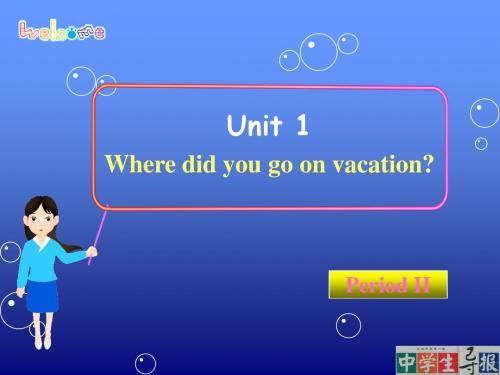
=Millie has none.
Summary 1. Something, anything, nothing and none are used to refer things.
2. Something is used in positive sentence while anything is used in negative sentence.
anything everything nothing everyone no one Dear Bill, How was your vacation? Did you do interesting? Did in the family go with you? I went to a friend's farm in the countryside with my family. was great. We fed some hens and saw some baby pigs. They were so cute! The only problem was that there was much to do in the evening but read. Still seemed to be bored. Bye for now! Mark
1.A: How many students are there? B: ______. None 2.A: Who can you see in the classroom? Nobody / No one B: ____________.
Ask your group questions about their last vacation. Then tell the class your results. Did you.... Everyone Someone (write No one classmate's name)
Unit 1 Period 2 高中英语新教材同步备课(人教版选择性必修第二册)
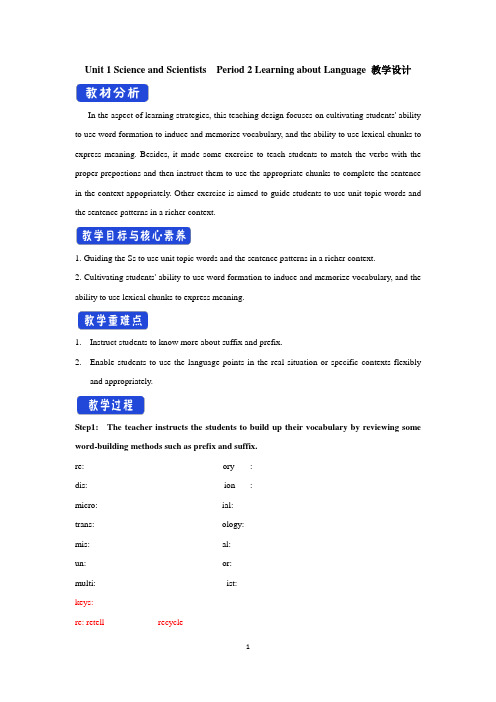
Unit 1 Science and Scientists Period 2 Learning about Language 教学设计In the aspect of learning strategies, this teaching design focuses on cultivating students' ability to use word formation to induce and memorize vocabulary, and the ability to use lexical chunks to express meaning. Besides, it made some exercise to teach students to match the verbs with the proper prepostions and then instruct them to use the appropriate chunks to complete the sentence in the context appopriately. Other exercise is aimed to guide students to use unit topic words and the sentence patterns in a richer context.1. Guiding the Ss to use unit topic words and the sentence patterns in a richer context.2. Cultivating students' ability to use word formation to induce and memorize vocabulary, and the ability to use lexical chunks to express meaning.1.Instruct students to know more about suffix and prefix.2.Enable students to use the language points in the real situation or specific contexts flexiblyand appropriately.Step1: The teacher instructs the students to build up their vocabulary by reviewing some word-building methods such as prefix and suffix.re:________________________ -ory : ________________________dis: ________________________ -ion : ________________________micro: ________________________ -ial: ________________________trans: ________________________ -ology: ________________________mis: ________________________ -al: ________________________un: ________________________ -or: ________________________multi: ________________________ -ist: ________________________keys:re: retell recycle-ory : theory contradictorydis: disappointdislike -ion :action inventionmicro: Microsoft microphone-ial: beneficial officialtrans: transform transport-ology: biology geologymis: misunderstand misleading-al: natural actualun: Unlike unhappy-or: actorinventor multi: multiple multinational-ist: biologist scientistStep2: Make phrases by combining the words in the left box with those on the right. Then complete the senteces using the proper forms of these phrases.1. Many scientist ____________________the view thatit is human activity that has causedglobal warming.2. He was to________________________the accident because he drove on the wrong side ofthe road.3. The man ________________being behind the robbery was seen crossing the street.4. Since heart disease is often ___________________our lifestyle choice, we need to makehealthy lving an important part of our lives.keys: subscribe to ; blame …for… suspect…of….. link…to….1.subscribed to2. blame for3. suspected of4. linked toStep 3: Fill in the blanks according to the grammar rules.1.I feel it is both of you who are__________ ( blame)for the spoiled child.2. The new student is________sincere that all classmates want to make friends with her.3. ________seemed that the sea lion didn't mind being with the tourists at all.4. Wang Peng sat in his empty restaurant feeling very ________ ( frustrate ) because no customers had come to his restaurant ever since he got up in the morning.5. The way that he did things was________ ( contradiction) to what he had said earlier this week.6.Your________ ( subscribe) will be automatically renewed each month without notice until you cancel it.7. He is coming here___________( pure) because he wants to participate in the football championships again.8. The police suspect him __________having a part in the jewel robbery.9. The vaccine is developed to protect the whole population against _________ (infect )of COVID-19.10. It was reported that Germany had taken a lot of measures to slow the rate of infection, including closing hair and beauty studios. Other non- essential shops __________ ( shut ) already.keys:1.to blame2. so3. It4. frustrated5. contradictory6.subscription7. purely8. of9.infection 10. had been shutStep 4: Complete the sentence according to the Chinese meanings.1. It is not unusual for an athlete to be h_____________(家喻户晓的)name while he is active, and quickly forgotten when his athletic career is over.2. I'm sure she'll h____________(处理) the changes very well because she's very adaptable.3. He was ready to serve dinner to his friends when he realized that he had forgotten to turn on the oven and the meat was _____________(生的) yet.4. He used his s_________________(重大的)influence to change the thinking of the scientific community on this issue.5. Scientists have collected more s________________(数据)than expected to prove the theory. keys:1.household 2.handle 3. raw 4. substantial 5. statisticsStep 5:Read this passage about medical science. Complete it using the words below.infection multiple decrease severetransform proof blame substantialBritish scientists believe they may have found a way to fight the common cold. It blocks a key protein in the body cells that is to __1______________ for the spread of cold-causing virus. Targeting he host rather than __2_______________was a bit non-traditional but made sense because it was tricky to target the virus. Cold-causing virus are not only of 3_____________kinds, they also _4______________ rapidly, meaning they can quickly develop resistance to medicine. Researchers are working on making a form of medicine that can be taken directly into one’s lungs, to5____________ the chance of side effects. Though these scientists have made __6__________________ advances in their research, further___7___________ is needed to make sure such drugs are not so __8____________ that they harm the body.keys:1.blame2.infection3. multiple4.transform5.decrease6.substantial7. proof8.severeStep 6: Dictate the key words and phrases in this unit.Part 1: key words:1. proof n.证据;证明;检验2. multiple adj.数量多的;多种多样的3. household n.一家人;家庭;同住一所(套)房子的人4. suspect vt.&vi.怀疑;疑有;不信任n.犯罪嫌疑人;可疑对象5. blame vt.把……归咎于;责怪;指责n. 责备;指责6. handle n.把手;拉手;柄vt. 处理;搬动;操纵(车辆、动物、工具等)7. intervention n.介入;出面;干涉8. link vt.把……连接起来;相关联n. 联系;纽带9. raw adj.未煮的;生的;未经处理的;原始的10. pure adj.干净的;纯的;纯粹的11. substantial adj.大量的;价值巨大的;重大的12. decrease n.减少;降低;减少量vt.&vi. (使大小、数量等)减少;减小;13. statistic n.[pl.]统计数字;统计资料;统计学14. transform vt.使改观;使改变形态vi.改变;转变15. thinking n.思想;思维;见解16. finding n. 发现;调查结果;(法律)判决17. initial adj. 最初的;开始的;第一的18. solid adj. 可靠的;固体的;坚实的n. 固体Part 2:Key phrases1.once and for all 最终地;彻底地2.subscribe to 同意;赞同3.thanks to 幸亏;由于4.attend to 照料;照顾5.think of 想起;考虑6.as a result of 由于……的结果7.in general 总之;通常;一般而言8.find out 找出;查明9.what's more 而且;另外Step 7: complete the discourse according to the grammar rules.Cholera used to be one of the most 1.__________ (fear) diseases in the world. In the early 19th century, _2_________ an outbreak of cholera hit Europe, millions of people died. But neither its cause, 3__________ its cure was understood. A British doctor, John Snow, wanted to solve the problem and he knew that cholera would not be controlled _4_________ its cause was found. In general, there were two contradictory theories 5 __________ explained how cholera spread. The first suggested that bad air caused the disease. The second was that cholera was caused by an _6_________(infect) from germs in food or water. John Snow thought that the second theory was correct but he needed proof. So when another outbreak of cholera hit London in 1854, he began to investigate. Later, with all the evidence he _7_________ (gather), John Snow was able to announce that the pump water carried cholera germs. Therefore, he had the handle of the pump _8_________ (remove) so that it couldn't be used. Through his intervention,the disease was stopped in its tracks. What is more, John Snow found that some companies sold water from the River Thames that __9__________________ (pollute) by raw waste. The people who drank this water were much more likely _10_________ (get) cholera than those who drank pure or boiled water. Through John Snow's efforts, the _11_________ (threaten) of cholera around the world saw a substantial increase.Keys:1.feared 2.when 3. nor 4.unless 5.that/which 6.infection 7.had gathered 8.removed 9.was polluted 10.to get 11. threat。
外研版三上 Unit 1 Period 2单元教学设计
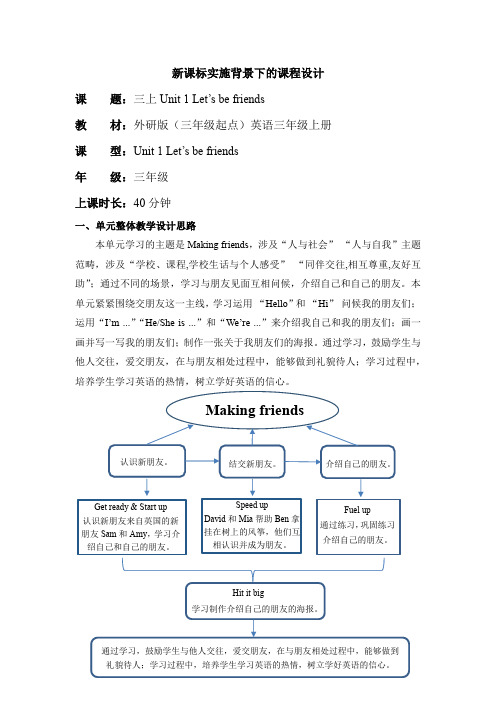
新课标实施背景下的课程设计课 题:三上Unit 1 Let’s be friends教 材:外研版(三年级起点)英语三年级上册 课 型:Unit 1 Let’s be friends 年 级:三年级 上课时长:40分钟一、 单元整体教学设计思路本单元学习的主题是Making friends ,涉及“人与社会” “人与自我”主题范畴,涉及“学校、课程,学校生话与个人感受” “同伴交往,相互尊重,友好互助”;通过不同的场景,学习与朋友见面互相问候,介绍自己和自己的朋友。
本单元紧紧围绕交朋友这一主线,学习运用 “Hello ”和 “Hi ” 问候我的朋友们;运用“I’m ...”“He/She is ...”和“We’re ...”来介绍我自己和我的朋友们;画一画并写一写我的朋友们;制作一张关于我朋友们的海报。
通过学习,鼓励学生与他人交往,爱交朋友,在与朋友相处过程中,能够做到礼貌待人;学习过程中,培养学生学习英语的热情,树立学好英语的信心。
通过学习,鼓励学生与他人交往,爱交朋友,在与朋友相处过程中,能够做到礼貌待人;学习过程中,培养学生学习英语的热情,树立学好英语的信心。
介绍自己的朋友。
Get ready & Start up 认识新朋友来自英国的新朋友Sam 和Amy ,学习介绍自己和自己的朋友。
认识新朋友。
Fuel up通过练习,巩固练习介绍自己的朋友。
Hit it big学习制作介绍自己的朋友的海报。
结交新朋友。
Speed up David 和Mia 帮助Ben 拿挂在树上的风筝,他们互相认识并成为朋友。
Making friends二、语篇研读(附图)What:本节课选自外语教学与研究出版社的英语(三年级起点)三年级上册Unit 1 Let’s be friends本部分学习的核心语言是学习用句型“He / She is ... We’re friends.”介绍自己的朋友;学习用句型“Let’s ...”提议做某事。
人教新目标九年级英语全一册Unit2period2教学设计
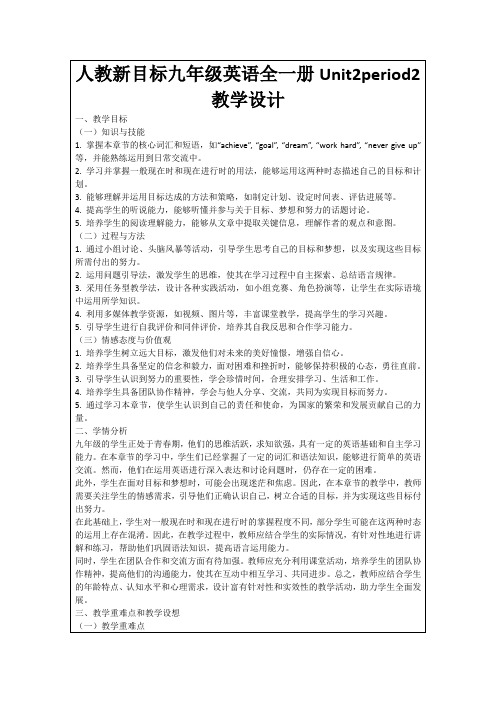
1.教师将学生分成小组,每组讨论一个与目标、梦想相关的话题,如:“如何设定一个合理的目标?”、“实现梦想需要具备哪些品质?”等。
2.各小组在讨论过程中,鼓励成员用英语表达自己的观点,并尝试运用本节课所学的语法和词汇。
3.各小组汇报讨论成果,教师对每个小组的表现进行点评,给予肯定和鼓励。
同时,学生在团队合作和交流方面有待加强。教师应充分利用课堂活动,培养学生的团队协作精神,提高他们的沟通能力,使其在互动中相互学习、共同进步。总之,教师应结合学生的年龄特点、认知水平和心理需求,设计富有针对性和实效性的教学活动,助力学生全面发展。
三、教学重难点和教学设想
(一)教学重难点
1.语法知识:一般现在时和现在进行时的用法是本章节的语法重点,学生需要掌握这两种时态的基本结构,并能正确运用到句子中。同时,区分两种时态的用法和场景,避免混淆。
-例如,让学生谈论自己的短期和长期目标,以及为实现这些目标所付出的努力。
2.任务驱动:设计各种任务,引导学生主动参与课堂活动,提高他们的语言实践能力。
-例如,小组合作完成一份关于目标实现的计划书,包括目标、具体措施、时间表等。
3.分层教学:针对学生的不同水平,设计难易程度不同的教学活动,使每个学生都能在原有基础上得到提高。
3.能够理解并运用目标达成的方法和策略,如制定计划、设定时间表、评估进展等。
4.提高学生的听说能力,能够听懂并参与关于目标、梦想和努力的话题讨论。
5.培养学生的阅读理解能力,能够从文章中提取关键信息,理解作者的观点和意图。
ቤተ መጻሕፍቲ ባይዱ(二)过程与方法
1.通过小组讨论、头脑风暴等活动,引导学生思考自己的目标和梦想,以及实现这些目标所需付出的努力。
人教新目标九年级英语全一册Unit2period2教学设计
2013年新版人教版新目标八上英语1-3单元教材解析
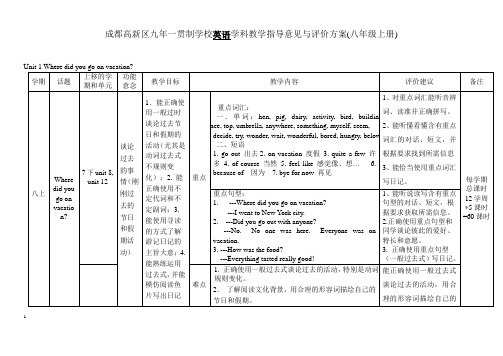
---No. No one was here. Everyone was on vacation.
3. ---How was the food?
---Everything tasted really good!
1、能听说读写含有重点句型的对话、短文,根据要求获取所需信息。2.正确使用重点句型和同学谈论彼此的爱好、特长和意愿。
Fantastic, talented, serious, necessary, both, land, similar, primasy, loudly, quietly, clearly, truly, though
二、短语
1.care about关心2. as long as只要3. be different from于…不同4. bring out使显现5. the same as与…相同6. in fact实际上7. be similar to与…相像的8. primary school小学
3.正确使用重点句型(一般过去式)写日记。
难点
1.正确使用一般过去式谈论过去的活动,特别是动词过去式不规则变化。
2.了解阅读文化背景,用合理的形容词描绘自己的节日和假期。
3.在写作过程中使用正确的应用文格式,能自我检查写作中的错误。
能正确使用一般过去式谈论过去的活动,用合理的形容词描绘自己的节日和假期,正确使用不定代词和副词(位置)。
学期
话题
上移的学期和单元
功能意念
教学目标
教学内容
评价建议
备注
八上
I’m more outgoing than my sister.
7下unit 9
2013春季初一级英语最新教材课件Module1Unit1

Unit 1 Whose bag is this?
What color is his cap? Yellow.
Our caps are purple. What color are your caps?
Whose bananas are those? They are our bananas.
另外,of 短语也可以用来表示所属关系。如: a map of China 一幅中国地图
小明在班上捡到一只钢笔,想找 到失主,但如何用英语说呢?
Help:
Whose pen is it? Is it your pen? Yes, it’s my pen/it’s mine. No, it’s not my pen/it’s not mine.
Ms Li: You’re welcome! Look at this nice watch. Is it yours too, Daming?
Daming: No, it isn’t. I think it’s Betty’s. Ling: Yes, it’s hers.
Ms Li: Everyone, please be careful with your things from now on.
Everyday English
● Welcome back! ● please be careful
with …from now on.
Listen and read.
Ms Li: Welcome back to school, everyone! First of all, come and look in the lost and found box! There are a lot of things in it. Whose bag is this?
2013版新目标九年级英语(1-10)
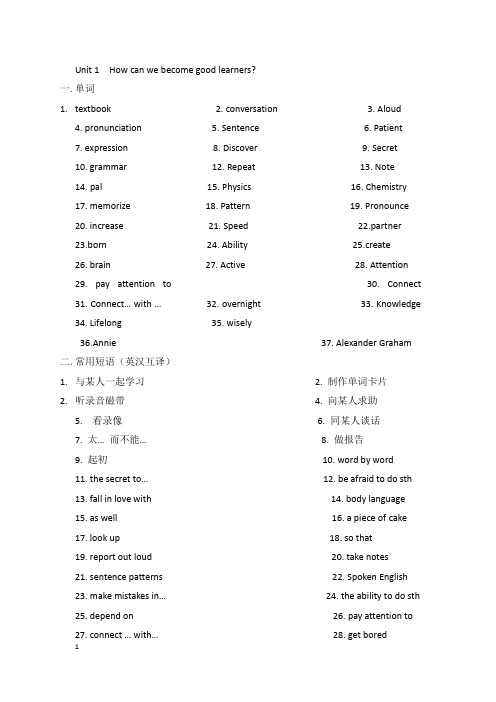
Unit 1 How can we become good learners?一.单词1.textbook2. conversation3. Aloud4. pronunciation5. Sentence6. Patient7. expression 8. Discover 9. Secret10. grammar 12. Repeat 13. Note14. pal 15. Physics 16. Chemistry17. memorize 18. Pattern 19. Pronounce20. increase 21. Speed 22.partner23.born 24. Ability 25.create26. brain 27. Active 28. Attention29. pay attention to 30. Connect31. Connect… with …32. overnight 33. Knowledge34. Lifelong 35. wisely36.Annie 37. Alexander Graham二.常用短语(英汉互译)1.与某人一起学习2. 制作单词卡片2.听录音磁带 4. 向某人求助5. 看录像6. 同某人谈话7. 太… 而不能… 8. 做报告9. 起初10. word by word11. the secret to… 12. be afraid to do sth13. fall in love with 14. body language15. as well 16. a piece of cake17. look up 18. so that19. report out loud 20. take notes21. sentence patterns 22. Spoken English23. make mistakes in…24. the ability to do sth25. depend on 26. pay attention to27. connect … with… 28. get bored29. be afraid of… 30. try to do sth31. be stressed out 32. each time 三.核心考点突破1. You can improve your English ___________ practicing more. ( by/with/of/ in)2. Linda’s father hates waiting in long lines. I think he’s just not very ___________. (patient/talented/popular/powerful)3. Tommy, you can never let others know what I have told you today. Don’t worry. I will keep the ______________. (secret/ money/ address/ grade)4. You don’t have to ____________ every new word in the dictionary while reading. (look for/ look up/ look at/ look after)5. When you visit a museum you should __________ the instructions and don’t be against them. (compare with/ look forward to/ pay attention to/ try out)6. ___________ you’ve tasted it, you can’t imagine how delicious the di shes are. (Because/ Although/ When/ Unless)7. Mr. Li, I can’t understand everything in class. Don’t worry! I’ll _________ the main points at the end. (record/ review/ require/ remember)8. He was ________ tired _________ he could not go on walking. (too, to/ such, that/ so, that)四.知能演练提升1.__________ children there are in a family, __________ their life will be. ( The less, the better/ The fewer, the better/ Fewer, richer/ More, poorer)2. Learning to write is learning to think. You don’t know things clearly __________ you can write them down. ( unless/ if/ since/ whether)3. Would you like some milk? No,thanks. I don’t like it, _________ I know it’s good for my health. (because/ though/ if/ unless)4. If Nancy __________ the exam, she will go to Australia for English study. (pass/ passed/ passes/ will pass)5. At times, parents find it difficult __________ with their teenage children. (talk/ talked/ talking/ to talk)6. Remember __________ off the lights when you leave the room, please. ( to turn/turning/ turn/ turned)7. I haven’t decided when __________ a holiday yet. (took/ taking/ to take/ take)8. To keep healthy, many people ___________ every day. (take a shower/ take pride/ take a look/ take exercise)9. What _________ can you give me on learning English? I think you could join an English club. ( advice/ news/ messages/ information)10. How do you like the talk show? I think it’s ________, but some people think it’s so ____________. (wonderful enough, bored/ enough wonderful, boring/ wonderful enough, boring)Unit 2 I think that mooncakes are delicious !一.重点单词1.Mooncake2. Lantern3. Stranger4.relative5. Put on6. Pound7. folk 8.godness 9.steal10. lay 11. Lay out 12.dessert 13.garden 14.admire 15.tie16.haunted 17. Ghost 18.trick19.treat 20.spider 21.Christmas 22.lie 23.novel 24. Eve25. dead 26. Business 27. Warn 28.end up 29. Present 30. Warmth31.spread32.Macao 33.Chiang Mai 34.Halloween 35.Eastern 36. Clara 37.Santa38.Charles 39.Scrooge 40.Jacob Marley 二.重点短语1.中国春节2.有点,一点儿3.增加体重4.两周后5.听起来像6.与什么相似7.相互,彼此8.呈…….的形状.9.在中秋之夜10. 射下11. 飞上……. 12.叫喊,大声说话13.摆开,布置14.做……的好时候15.母亲节16.父亲节17.装扮18.认为,想起19.开…….的玩笑20…….的精神21……的重要性22.关心,在意23.挣钱24.过去常常做……25.最终成为,最后处于26.使某人想起27.醒来28.需要中的,困难中的29……. 的开始30.在什么与什么之间31.发放,分发32.不仅…….而且…….三.核心考点突破1.They wonder_________ robots will make humans lose their jobs or not. (that/if/ whether)2. I wonder when you ________ in New York. I will send an e-mail to you as soon as I _________ there. ( arrive, will get/ will arrive, get/ will arrive, will get)3.________ great picture! Who painted it? ( How/ What/ How a/ What a)4. ________ lovely the squirrel is? ( What a / How/ What/ How a )5. The children will climb the hill if it ________ tomorrow. ( won’t rain/ didn’t rain/ isn’t raining/ doesn’t rain )6. He was ________ tired _________ he could not go on walking. ( too, to/ such, that/ so, that)7. I found a letter __________ on the floor when I came into the classroom. (lying/ lay/ lie/ lies)8. lots of students feel sleepy in class at present, because they have to get up early in the morning. ( now/ in the future/ then /during the time)四.知能演练提升1. let’s go to the community if it ___________ tomorrow. But nobody knows if it ___________ tomorrow. ( won’t rain, rains/ doesn’t rain, rains/ doesn’t rain, will rain/ won’t rain, will rain)2. Why are you walking so quickly, Edward? There ___________ a talent show in ten minutes. ( will have/ will be/ is going to have/ are going to be )3. __________ excellent work you have done! It’s very kind of you to say so. ( What an/ How/ What / How a )4. Many social workers went to Ya’an to help __________ clean water and food to the local people to reduce their pain from the earthquake. ( put out/ come out/ work out/ give out )5. He promised __________ his old friend during his stay in Tianjin. ( see/ seeing/ saw/ to see)6. ________ is good idea ________ your English by reading aloud in the morning. (This, improve/ It, to improve/ This, to improve/ It, improving)7. Where did you put the books, Anne? I ________ them on the shelf. ( lie/ lied/ lay/ laid)8.The children decide __________ their schoolyard this Friday afternoon.(clean/to clean/ cleaning/ cleaned)9.What languages ____________ in that country? German and English. ( arespeaking/ are spoken/ speak/ is spoken)10. Our teacher often tells us ____________ in the river. It’s dangerous. ( don’tswim/ not swim/ not to swim/ not swimming)五.完成句子1.这个婴儿已经长到了五磅重。
2013版新目标八年级上册英语Unit1period1
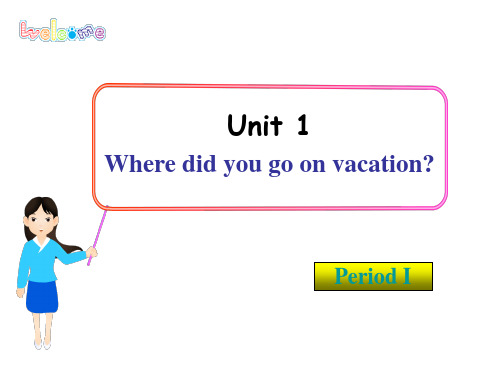
1b Listen and number the people in the picture [1-5].
4 5
1. Tina
2. Bob
3. Sally
4. Xiang Hua
2
5. Tom
3
1c Make conversations about the people in 1a.
A: Where did Tina go on vacation? B: She went to the mountains.
2.There w__as__(be) a shop long ago. 3.Jenny _d_id_n_’__t _g_o_ (not go) to bed until
11:00 O’clock last night. 4.Danny _re_a_d (read) English five minutes
went to the mountains tiring
Where did you go on vacation? How was your vacation?
went to the beach relaxing
Where did you go on vacation? How was your vacation?
3.They went to the movies yesterday.
go
• go swimming • go fishing • go sightseeing • go hiking • go camping • go shopping • go skating • go bike riding
去游泳 去钓鱼 去观光旅游 去徒步旅行 去 野营 去购物 去溜冰 骑自行车旅行
2013年春新目标八年级英语第一次月考试题及答案
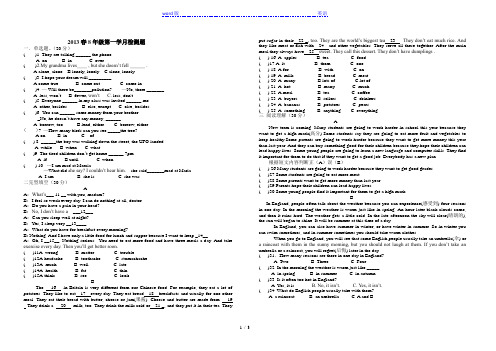
2013春8年级第一学月检测题一.单选题。
(20分)( )1. They are talking ______ the phone.A. onB. inC. over( )2.My grandma lives____ , but she doesn’t fell ______ .A.alone, aloneB.lonely, lonelyC.alone, lonely( )3. I hope your dream will _________.e trueB. come outC. come in( )4. — Will there be_______pollution? —No, there _______.A. less, won’tB. fewer, won’tC. less, don't( )5. Everyone ______ in my class was invited ______ me.A. other, besidesB. else, exceptC. else, besides( )6.-You can ______ some money from your brother._No, he doesn’t have any money, ______.A. borrow, tooB.lend, eitherC. borrow, either( )7. —How many birds can you see _____the tree?A.onB. inC. of( ) 8. ______the boy was walking down the street, the UFO landed.A. whileB. whenC. what( )9. The tired children don’t get home ______ 7pm.A. ifB.untilC. when( ) 10. —I am mad at Marcia.—What did s he say? I couldn’t hear him. she said_______mad at Maria.A. I am.B. she is.C. she was.二完型填空(30分)AA:What’s___ 11 __ with you, madam?B:I feel so weak every day. I can do nothing at all, doctor.A:Do you have a pain in your head?B:No, I don’t have a ___12___ .A:Can you sleep well at night?B:Yes, I sleep very __13____ .A:What do you have for breakfast every morning?B: Nothing. And I have only a little food for lunch and supper because I want to keep _14__ .A:Oh, I __15__. Nothing serious . You need to eat more food and have three meals a day. And take exercise every day. Then you’ll get better soon.( )11A. wrong B. matter C. trouble( )12A.headache B. toothache C. stomachache( )13A. much B. well C. late( )14A. health B. fat C. thin( )15A.think B. see C. lookBThe 16 in Britain is very different from our Chinese food. For example, they eat a lot of potatoes. They like to eat 17 every day. They eat bread 18 breakfasts and usually for one other meal. They eat their bread with butter, cheese or jam(果酱). Cheese and butter are made from 19 .They drink a 20 milk, too. They drink the milk cold or 21 _, and they put it in their tea. They put sugar in their 22 _, too. They are the world’s biggest tea23 . They don’t eat much rice. And they like meat or fish with 24 and other vegetables. They serve all these together. After the main meal they always have 25 sweet. They call this dessert. They don’t have dumplings .( ) 16. A. apples B. tea C. food( )17.A. it B. them C. one( ) 18. A.for B. with C. on( ) 19. A. milk B. bread C. meat( ) 20. A. many B.lots of C.lot of( ) 21. A. hot B. many C. much( ) 22. A.meal B. tea C. coffee( ) 23. A. buyers B. sellers C. drinkers( ) 24. A. bananas B. potatoes C. pears( ) 25. A. something B. anything C. everything三阅读理解(30分)ANew term is coming. Many students are going to work harder in school this year because they want to get a high mark(高分).Some students say they are going to eat more fruit and vegetables to keep healthy.Some parents are going to work harder because they want to get more money this year than last year. And they can buy something good for their children because they hope their children can lead happy lives. Some young people are going to learn a new language and computer skills. They find it important for them to do that if they want to get a good job. Everybody has a new plan.根据短文内容判断正(A)误(B).( ) 26.Many students are going to work harder because they want to get good grades.( )27.Some students are going to eat more meat.( )28.Some parents want to get more money than last year.( )29.Parents hope their children can lead happy lives.( )30.Some young people find it important for them to get a high mark.BIn England, people often talk about the weather because you can experience(感受到) four seasons in one day. In the morning the weather is warm just like in spring. An hour later black clouds come, and then it rains hard. The weather gets a little cold. In the late afternoon the sky will clear(晴朗的), the sun will began to shine. It will be summer at this time of a day.In England, you can also have summer in winter, or have winter in summer. So in winter you can swim sometimes, and in summer sometimes you should take warm clothes.When you go to England, you will see that some English people usually take an umbrella(伞) or a raincoat with them in the sunny morning, but you should not laugh at them. If you don’t take an umbrella or a raincoat, you will regret(后悔) later in the day.( )31.How many seasons are there in one day in England?A. TwoB. ThreeC. Four( )32. In the morning the weather is warm just like _____.A. in springB. in summerC. in autumn( )33. Is it often too hot in England?A. Yes, it isB. No, it isn’t.C. Yes, it isn’t.( )34. What do English people usually take with them?A. a raincoatB. an umbrellaC. A and B( )35. What’s the weather like in England?A. warmB. changeableC. coldCMr. Jones had a nice brown coat. He loved it very much, but his wife did not like it because it was old. She often said, ”Give it to a poor man.” But Mr.Jones always said, ”N o.I like this coat.”Then one day a cigarette(香烟) fell on it and made a hole in it. So Mrs.Jones said, ”Please don’t wear it again.” Mr.Jones took it to a small tailor(裁缝)and said, ”Please make new coat like this one.” The tailor made the coat very careful ly. Then he lit(点燃)a cigarette, and made a hole in the same place.( )36.Mrs.Jones didn’t like the coat because___.A.it was nice .B. it was not niceC. it was old( )37. Mrs.Jones often asked her husband to ___.A.buy a new coatB. give the old coat to a poor manC. make a new coat ( )38. __ made a hole in it, so Mr.Jones took it to a tailor.A.A cigaretteB. Mr.JonesC. Mrs.Jones( )39. Mr.Jones asked the tailor to___.A .make a new hole in the old coat B. make a hole in the new coatC. make a new coat like the old one( )40. Who do you think was foolish(愚蠢)?A.The tailor.B. Mr.Jones.C. Mrs.Jones.what, when, remember, on, event, kill, although, hear, one, doheard the news of important__3___ in history. In the United States. For example, many people remember what they were ___4___ on April4, 1968.This is __5___ of the most important events in modern American history. ____6__ this day, Dr Martin Luther King was___7__ in the city of Memphis in America. ___8____ some people may not remember who murdered him, they remember ____9___ they were doing when they ___10____ about the event.五.作文(10分)未来会发生什么呢?对于未来,你一定有很多设想吧?那现在就来做一个小预言家吧,把你心目中50年后的世界大胆地描绘出来,说不定会实现哦!2013春8年级英语第一学月检测题答题卡1 2 3 4 5 6 7 8 9 1011 12 13 14 15 16 17 18 19 20 21 22 23 24 25三.阅读理解(30分)26_____ 27_______ 28_______ 29_______ 30_______31_____ 32_______ 33_______ 34______ 35_______36______ 37_______ 38______ 39______ 40_______四. 选词填空(10分)1_______ 2_______ 3 ________ 4_______ 5_________6_______ 7________ 8_________ 9_______ 10_______五.作文(10分)2013春8年级英语第一学月检测题答题卡三.阅读理解(30分)26__A___ 27___B____ 28___A____ 29___A____ 30___B____ 31___C__ 32____A___ 33____B___ 34____C__ 35___B____ 36__C____ 37____B___ 38___A___ 39___C___ 40____A___四. 选词填空(10分)1 remember 2when 3 events 4 doing 5 one6 On7 killed8 Although9 what 10 heard六.作文(10分)。
- 1、下载文档前请自行甄别文档内容的完整性,平台不提供额外的编辑、内容补充、找答案等附加服务。
- 2、"仅部分预览"的文档,不可在线预览部分如存在完整性等问题,可反馈申请退款(可完整预览的文档不适用该条件!)。
- 3、如文档侵犯您的权益,请联系客服反馈,我们会尽快为您处理(人工客服工作时间:9:00-18:30)。
Writing: 假设你擅长音乐或讲故事,你很想参
加学校公演,现在给你的英语老师写一份信说明 你的特长和愿望。 Dear Ms. Jiang, I am Jane from Class ... _________________________ _________________________________________________ _________________________________________________ _________________________________________________ ______ . Yours sincerely, Jane
Unit One
Can you play the guitar?
Period Two 2d-3c
Guess what they can do.
Can she/ he / they…?
She can dance.
He can swim.
She can play the guitar.
Guess what they can do.
A: What club do you want to join?
B: I want to join the
swimming club.
the swimming club A: Can you swim? B: No, I can’t. But I like
swimming.
情态动词can 的用法:can + V. 会做 / 能做......
We will have a school show in the new term. Do you want to join the school show? What can you do?
What can you do for the school show? Let’s go to see the poster . (让我们去看一看海报。)
Dear Ms. Jiang, I am Jane from Class 9. It is nice to read the poster for school show. I want to take part in it very much. I am good at music. I can sing and dance. Besides, I can play the guitar well. By the way, I can be good with (与......和得来)other students. Please write to me soon! Yours, Jane
Read the conversation in 2d. Fill in the chart.
Name what can they do
Bob Jane
clubs
play soccer
Hale Waihona Puke a sports club
the story telling club
tell stories draw
the art club
1.Wu Jun /speak English /speak Chinese ______________________________________ Can Wu Jun speak English? No, he can't, but he can speak Chinese. 2.Mike /play basketball/ play tennis Can Mike play basketball? No, he can't, but he can play tennis. _______________________________________ 3.Jane and Jill/dance/sing Can Jane and Jill dance? No, they can't, but they can sing. _______________________________________ 4.Grace/play soccer/play volleyball _______________________________________ Can Grace play soccer? No, she can't, but she can play volleyball. 5.Bill/write stories/tell stories Can_______________________________________ Bill write stories? No, he can't, but he can tell stories.
can’t=cannot
Yes, I can./No ,I can’t.
Yes, he can./ No ,he can’t. Yes, we can./ No ,we can’t. Yes, they can ./No ,they can’t. I can dance./I can’t sing. We want to join the chess club.
Bob: What about you? You are very
good at _____________. telling stories You can
join the ___________ story telling club. Jane: _______ Sounds good. But I like to _____, draw too. Bob: Then join two _____, clubs the story telling club and the ____ art club! Jane: OK, let’s join now!
2d Role-play the conversation.
Jane: Hi, Bob. What club do you want to join? Bob: I want to join a sports club. Jane: Great! What sports can you play? Bob: Soccer. Jane: So you can join the soccer club. Bob: What about you? You are very good at telling stories. You can join the story telling club. Jane: Sounds good. But I like to draw, too. Bob: Then join two clubs, the story telling club and the art club! Jane: OK, let’s join now!
sing dance /æ / swim -Can you…? 你能...吗? draw / paint sing play chess dance play chess play the guitar swim draw/ speak English /e/ 用英语讲故事 -Yes, I/… can.
In my group, A can …,but/and he can … very well. B can…, and /but she can…
Homework
guitar? Can you ______ tell stories? Please tal
k to Mr.Zhang after school.
wanted
wanted 是want的过去式和过去分词 “sb. wanted” 结构常用于招聘或启事等的标题 。 如:Teacher Wanted 招聘教师 Cook Wanted 招聘厨师 Help wanted 寻求帮助 students wanted for school show 学校公演招募学生
I can … and …
I can …, but I can’t … play chess
Ab c d e hello good Morning! …
speak English
paint
swim
3a Write question and answers with the words and phrases.
Read the conversation and fill in the blanks. club do you want Jane: Hi, Bob. What _____
to join?
sports club. Bob: I want to join a ______ play Jane: Great! What sports can you _____? Bob: Soccer. Jane: So you can ____ join the soccer club.
Complete the following poster 3b with the words in the box.
play sing tell dance
Students Wanted for School Show
We want students for the school show. Can you _____ sing or ______?Can you _____the dance play
paint
play the guitar
-No, I/… can’t.
/gI't a: / speak English
tell stories in English
/i:/
Grammar Focus
Can you swim?
Can he play chess? Can you speak English? Can Jane and Jill swim? What can you do ? What club do you want to join?
